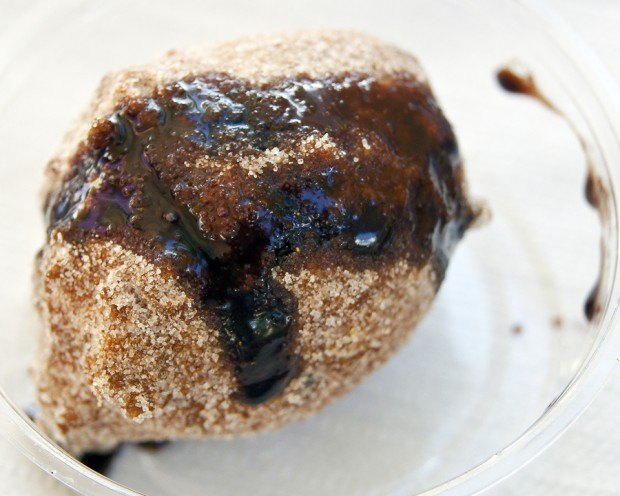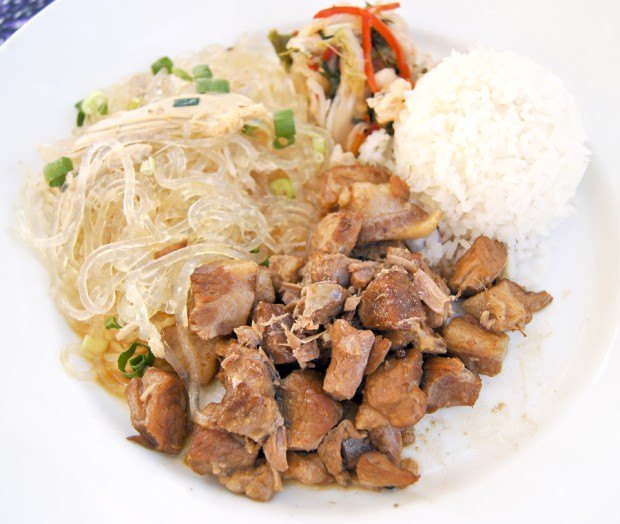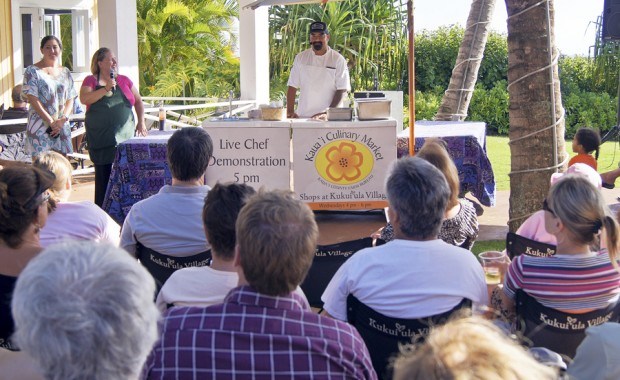PO‘IPU — Food was one form of communication among Kaua‘i’s people of different cultures, said Melissa McFerrin, event coordinator for the Koloa Plantation Days and the Kaua‘i County Farm Bureau. “People tried the different foods of the different cultures which
PO‘IPU — Food was one form of communication among Kaua‘i’s people of different cultures, said Melissa McFerrin, event coordinator for the Koloa Plantation Days and the Kaua‘i County Farm Bureau.
“People tried the different foods of the different cultures which appeared in the plantation camps and that was the basis of people starting to talk with each other,” McFerrin said. “Sugar is not that far away, the last plantation closing within recent memory.”
Merriman’s Executive Chef Mark Arriola said “local food” is an evolution of the different cultures. He referred to items he learned after being loaned a copy of Stacie Chiba’s grandmother’s cookbook. Chiba is the assistant real estate manager for The Shops at Kukui‘ula.
“‘Local food’ is food we all like to eat,” Arriola said. “I’m originally from Texas and learned about ‘local food’ from eating where the people eat, not at the restaurant.”
He said local food started in the plantation camps and is an evolution of cultures when the plantation brought in the different people as a cheap source of labor.
As an example, pork adobo, a Filipino favorite with a vinegar base, takes about five hours to cook up, the pork being simmered for most of the time.
People had to work, so they put it in a pot with vinegar and while they were working, the pork was cooking, waiting to greet them with a delicious meal when they came home from work, he said.
“Today, we have a melting pot (of cultures) on the plate,” Arriola said, noting the Merriman’s Downstairs was featuring the recipes he demonstrated during the Kaua‘i Culinary Market coordinated by the Kaua‘i County Farm Bureau and The Shops at Kukui‘ula as a part of the Koloa Plantation Days.
“The pork adobo is from the Filipino culture, the Chicken Long Rice is originally from the Chinese, but the Hawaiian people adapted it, and since fruit is plentiful during this time of the year, apple banana is added to malasada, coming from the Portuguese culture.”
Visit www.merrimanshawaii.com/kauai.htm for more information.
Pork Adobo
1-1/2 pound pork butt, cubed
1 head garlic
4 tsp. salt
1 Tbls. oil
1/2 cup Vinegar
1 Tsp. black peppercorn
2 cup water
Place the pork in a saucepan. Add vinegar, garlic, pepper, salt, soy sauce and water. Cover the saucepan and cook slowly until the meat is tender and most of the broth has evaporated (only 1/4 cup remains).
Drain, saving the broth. Separate the pieces of garlic from the pork and fry garlic in oil until brown.
Add the pieces of pork and fry until brown. Add the broth and simmer about five minutes. Serve hot.
Apple Banana Malasada
2 cups banana
6 cups flour
2 Tbls. baking powder
4 eggs
2 cups milk
2 tsp. salt
1-1/3 cup sugar
4 Tbls. oil
Cinnamon and sugar to coat
Preheat deep fryer to 350 degrees. In a large bowl, mash bananas and fold in all ingredients. Scoop into hot fryer and deep fry until golden brown. Sprinkle with cinnamon and sugar.
Chicken Long Rice
1 whole chicken
3 long rice bundles
1 piece ginger
2 onions, sliced
Pinch of Hawaiian salt,
Chopped green onions
Boil chicken in pot with ginger and enough water to cover chicken.
Simmer until bones can be removed from chicken. Remove chicken and shred the meat.
Add long rice, onion and salt to broth.
Add shredded chicken and simmer until long rice is done.
Serve with chopped green onion.




